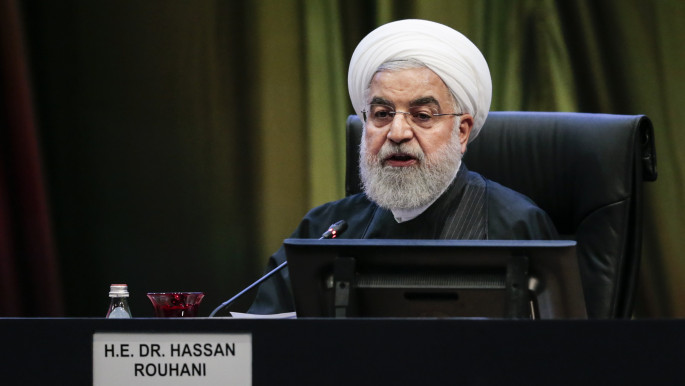Follow us on Twitter and Instagram to stay connected
Kuala Lumpur Islamic Summit: Islamophobia and Palestine leading issues Muslims face
Iranian President Hassan Rouhani, Turkish president Recep Tayyip Erdogan and Qatari Emir Sheikh Tamim bin Hamad Al-Thani also used their speeches to highlight the Palestinian crisis as they remain under Israeli occupation.
Mahathir said the summit, which will end on Saturday should address the world's perceptions of Islam, the rise of Islamophobia, the "decline of the Islamic civilisation" and reforms in governance needed by Muslim nations.
"We are not discriminating or isolating anyone," he said in his welcome speech, watched on by leaders including Turkish President Tayyip Erdogan, Iranian President Hassan Rouhani and Qatari Emir Sheikh Tamim bin Hamid Al-Thani.
"We are attempting to start small and if these ideas, proposals and solutions are acceptable and proved workable, then we hope to take it up to the larger platform for consideration."
Erdogan struck a similar tone. "We will have the opportunity to talk freely about our issues, from Islamophobia to terrorism, divisions, internal fights ravaging our region, and sectarian and ethnic conflicts," he told the summit.
Divisions are felt
The Summit got off to a rocky start with Mohamad defending the gathering after it was criticised by Saudi Arabia for undermining the bigger Organisation of Islamic Cooperation (OIC).
Mahathir said the Kuala Lumpur Summit was meant to understand why Islam, the Muslims and their countries were "in a state of crisis, helpless and unworthy of this great religion".
Divisions were felt at the event as only 20 countries sent leaders or delegations to the Kuala Lumpur Summit, even though all 57 members of the OIC were invited.
Leaders gathered in the Malaysian's capital Kuala Lumpur to speak on a host of issues impacting Muslims around the world, with notable absences from Saudi Arabia and Pakistan, both of whom gave it a miss.
Pakistan President Imran Khan is thought to have been pressured into giving the summit a miss by its Middle Eastern allies, Saudi Arabia and UAE, though official media reports deny any connection.
 |
| Rouhani slammed Israel for its occupation of the Palestinian Territories [Getty] |
Threats to the Middle East
Iran's Rouhani talked about the "security threats" that the Middle East face, and he gave particular emphasis to the "Zionist regime" - a reference to Israel.
Rouhani maintains that the Palestinian issue is the most important problem in the Muslim world.
Qatar's Emir Sheikh Tamim echoed his sentiments, calling the occupation of the Palestinian Territories "one of the most importance sources of instability in our region" and went on to criticise the annexation of Palestinian lands and the building of illegal settlements.
The "Judaisation of Jerusalem", he said, referencing the row over the Israeli embassy, are examples of policies that "wipe out the Arab character of the city and provoke the feelings of Arabs and Muslims everywhere".
Saudi Arabia was the recipient of criticism, though Rouhani didn’t mention it by name, saying the "mental and behavioural radicalism" of some Muslim countries "paved the way to foreign interventions" in the region.
"The war in Syria, Yemen, and riots and turbulence in Iraq, Lebanon, Libya and Afghanistan is the outcome of the combination of domestic extremism and foreign intervention."
He concluded by calling Iran a "model of residence" and encouraged Muslim countries to develop their own economic framework "to save it from the domination of the US dollar and the American financial regime".
Erdogan led with Palestine, too. "If we still haven’t made any progress regarding the Palestinian cause, if we still can’t stop the exploitation of our resources, if we still can’t say ‘stop’ to the fragmentation of the Muslim world over sectarianism, that’s why," he said.
He also talked about the UN Security Council’s permanent members, who have veto power.
"The world is bigger than five," he told the delegates and world leaders.



